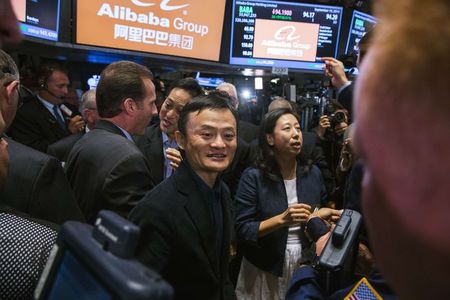By Saqib Iqbal Ahmed
NEW YORK (Reuters) - The newest way to bet on the fortunes of Chinese e-commerce heavyweight Alibaba Group Holding Ltd will debut on Monday when its stock options go live for trading, and investors should look for the initial action to be very busy, but also choppy and potentially pricey.
Options market traders say Alibaba puts and calls will likely see heavy demand given the interest shown so far in the stock since its record-setting $25 billion initial public offering last week.
First-day volume in the stock last Friday topped 270 million shares and has averaged around 40 million shares a day since, keeping it near the top of the New York Stock Exchange's most-active list each day.
"I would expect Alibaba's options to have a built-in demand, so to speak, as obviously all the people who want to get into the IPO at the beginning didn't," said J.J. Kinahan, chief market strategist at retail brokerage TD Ameritrade Holding Corp.
U.S. options exchanges, including the Chicago Board Options Exchange, the C2 Options Exchange, ISE and ISE Gemini, are expected to list contracts on Alibaba on Sept. 29. Their debut will open the gates to a flood of speculators and hedgers to begin opening positions premised on where they think the stock will trade at various future dates.
Contract volume is expected to be among the more active of any name once the options are listed, said WhatsTrading.com options strategist Fred Ruffy.
Still, it probably will not see quite the frenzy of interest shown in Facebook Inc options when they hit the market after the company's botched IPO in May 2012.
Brian Overby, senior options analyst at online brokerage TradeKing in Charlotte, North Carolina, sees Alibaba's first-day options volumes at about a quarter of Facebook's. The social media company's options volume set a record for a first day of trading with 365,000 contracts changing hands. Puts outnumbered calls by a ratio of 1.25:1 in its options debut on May 29, 2012.
Puts convey the right to sell the stock at a set price at a future date, while calls provide the right to buy it at a certain price at a date down the road.
VOLATILITY IS THE KEY
Trading Alibaba options will be tricky at the beginning, Overby said.
Option prices, called premiums, trade at a fraction of the underlying stock's price. But given the stock is still trading around $90 and daily price swings are wide, Alibaba's options are not likely to be super cheap.
Moreover, making the initial determinations for what those levels should be across potentially dozens of strike prices and contract expiration dates could be dicey.
"At the start there will most likely be wide bid/ask spreads on the option contracts until the market makers have some price discovery," Overby said.
Implied volatility, a measure of the risk that big moves in the stock pose and a key component in setting options prices, is typically high for companies immediately after their IPO.
"Amazon.com Inc trades with an implied volatility of 27 percent. I would expect Alibaba to trade above that level for some time," said Ophir Gottlieb, chief executive officer at Los Angeles-based Capital Market Laboratories LLC.
Looking at other stocks in Alibaba's price range offers some clues about just how widely its options prices may vary.
For instance, at-the-money options expiring in December on Apple Inc, currently around $98 and with a 90-day implied volatility of around 23 percent, last traded at $5.16 for calls and $4.65 for puts.
But the December at-the-money options for TripAdvisor Inc, trading around $91.50 with an implied volatility nearing 40 percent, last crossed at $10.60 for calls and $6.30 for puts.
NEW PLATFORM FOR SHORTS
The start of options trading also will give short sellers an additional venue for betting on a drop in the stock. Alibaba's share price has now retreated around 5 percent after a first-day gain of about 38 percent.
If the shares are difficult to borrow to sell short given it is still so soon after the IPO, that could drive more shorts into Alibaba options as an alternative and this could put downward pressure on the stock, said Henry Schwartz, president at options analytics firm Trade Alert.
The cost to borrow Alibaba shares has varied widely in the days since the IPO.
On Thursday, for instance, annual borrowing costs started the day in the 25 percent region, but plunged soon afterward, now registering just 0.2 percent, according to Karl Loomes, market analyst at SunGard's Astec Analytics. That is about the same as to borrow IBM or Ford Motor Co shares.
The cost to borrow the average stock for shorting typically is negligible unless the stock is listed as hard to borrow.
"Though this is fairly low for the first days of securities lending following such a highly publicized IPO, it is probably mostly on the back of such high availability of stock to borrow rather than signifying a lack of demand," Loomes said.

Some 368 million shares were sold in the IPO, following the exercise of over-allotment options by the deal's underwriters.
(Editing by Dan Burns and Matthew Lewis)
